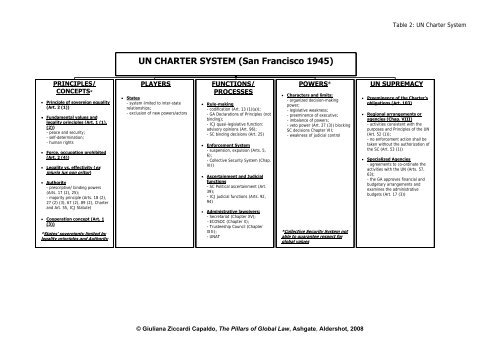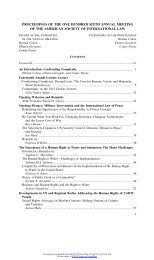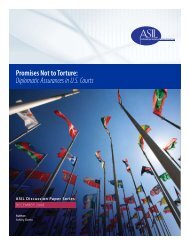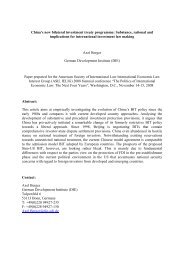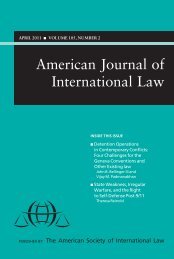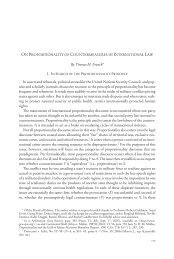westphalian system (1648) - American Society of International Law
westphalian system (1648) - American Society of International Law
westphalian system (1648) - American Society of International Law
Create successful ePaper yourself
Turn your PDF publications into a flip-book with our unique Google optimized e-Paper software.
PRINCIPLES/<br />
CONCEPTS*<br />
• Principle <strong>of</strong> sovereign equality<br />
(Art. 2 (1))<br />
● Fundamental values and<br />
legality principles (Art. 1 (1),<br />
(2))<br />
- peace and security;<br />
- self-determination;<br />
- human rights<br />
• Force, occupation prohibited<br />
(Art. 2 (4))<br />
• Legality vs. effectivity (ex<br />
iniuria jus non oritur)<br />
• Authority<br />
- prescriptive/ binding powers<br />
(Arts. 17 (2), 25);<br />
- majority principle (Arts. 18 (2),<br />
27 (2) (3), 67 (2), 89 (2), Charter<br />
and Art. 55, ICJ Statute)<br />
• Cooperation concept (Art. 1<br />
(3))<br />
*States’ sovereignty limited by<br />
legality principles and Authority<br />
UN CHARTER SYSTEM (San Francisco 1945)<br />
PLAYERS<br />
• States<br />
- <strong>system</strong> limited to inter-state<br />
relationships;<br />
- exclusion <strong>of</strong> new powers/actors<br />
FUNCTIONS/<br />
PROCESSES<br />
• Rule-making<br />
- codification (Art. 13 (1)(a));<br />
- GA Declarations <strong>of</strong> Principles (not<br />
binding);<br />
- ICJ quasi-legislative function:<br />
advisory opinions (Art. 96);<br />
- SC binding decisions (Art. 25)<br />
• Enforcement System<br />
- suspension, expulsion (Arts. 5,<br />
6);<br />
- Collective Security System (Chap.<br />
VII)<br />
• Ascertainment and Judicial<br />
functions<br />
- SC Political ascertainment (Art.<br />
39);<br />
- ICJ judicial functions (Arts. 92,<br />
94)<br />
• Administrative lawgivers:<br />
- Secretariat (Chapter XV);<br />
- ECOSOC (Chapter X);<br />
- Trusteeship Council (Chapter<br />
XIII);<br />
- UNAT<br />
POWERS*<br />
• Characters and limits:<br />
- organized decision-making<br />
power;<br />
- legislative weakness;<br />
- preeminence <strong>of</strong> executive;<br />
- imbalance <strong>of</strong> powers;<br />
- veto power (Art. 27 (3)) blocking<br />
SC decisions Chapter VII;<br />
- weakness <strong>of</strong> judicial control<br />
*Collective Security System not<br />
able to guarantee respect for<br />
global values<br />
© Giuliana Ziccardi Capaldo, The Pillars <strong>of</strong> Global <strong>Law</strong>, Ashgate, Aldershot, 2008<br />
Table 2: UN Charter System<br />
UN SUPREMACY<br />
• Preeminence <strong>of</strong> the Charter’s<br />
obligations (Art. 103)<br />
• Regional arrangements or<br />
agencies (Chap. VIII)<br />
- activities consistent with the<br />
purposes and Principles <strong>of</strong> the UN<br />
(Art. 52 (1));<br />
- no enforcement action shall be<br />
taken without the authorization <strong>of</strong><br />
the SC (Art. 53 (1))<br />
• Specialized Agencies<br />
- agreements to co-ordinate the<br />
activities with the UN (Arts. 57,<br />
63);<br />
- the GA approves financial and<br />
budgetary arrangements and<br />
examines the administrative<br />
budgets (Art. 17 (3))


